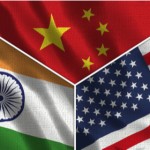Every American election has wide-ranging implications, but this one will have global consequences because the Chinese challenge to American primacy has hardened as the coronavirus pandemic rages everywhere except in China. Regardless of who wins the election, the policies of the next US administration will be critical for India because the starting locus of the US-China rivalry is China’s ambition to dominate Asia.
China has become the foremost manufacturing power by gaming the rules of the World Trade Organization. Most countries are economically linked to China because of its central role in global supply chains. This has forced the West—which had until recently identified China as a market where their corporations made profits—to grapple with the systematic threat it increasingly poses to the rules-based global order sustained by the US, the EU and NATO. Now, China’s efforts to change the rules and impose its dominance in the economic and strategic spheres is forcing countries to choose between China and the West.
That is a difficult choice, because many economies are dependent on China, even as it has become the chief source of dissonance in their sphere because it has acquired massive influence on governments. For instance, by its mammoth investments in and trade with some Asean countries, China has split that Asian organization that had been the centre of attempts to institutionalize security arrangements in Asia. Countries such as Cambodia and Laos do not have any claims in the disputed South China Sea and, hence, do not support the unified Asean position on the issue, while Vietnam, the Philippines and Malaysia have claims.
In Europe, China attempted to create disunity by establishing a China-plus 17 Forum, incorporating central and east European countries. Greece is a member of this forum and last year it disallowed an EU resolution criticizing Chinese violation of human rights. Hence, many countries trying to have both economic benefit from China and security from the US will be leaning more towards the West because China has become so territorially expansive and militarily aggressive. This is now visible on India’s northern border and in the South China Sea, in the open threats to Japan and Taiwan, and the repression of the Tibetan and Uighur minorities within its own territory.
India, too, has struggled with its strategy to deal with China, even dreaming of an Asian century with both India and China growing together. That fantasy is now over. Past Indian efforts to placate China appear to have been abandoned because of the outrage by repeated Chinese aggression on the border, and because the economic catch-up is in the distance: the Chinese economy is almost five times bigger than India’s.
The recent in-person Quad meeting attended by external affairs minister S. Jaishankar and the ongoing India-US 2+2 meeting of foreign and defence ministers in New Delhi, highlights not only the big upgrade in India’s strategic relations with the US but also the enhanced US focus on India, the Indo-Pacific and Asia.
Clearly then, the foreign policy of the next US administration will impact India, Asia and the world. Trump’s disruptive style and hostile posture on China have forced the developed world to acknowledge Chinese unfair trade practices, technology theft, and discriminatory investment opportunities. It has pushed developing nations into debt traps via its Belt and Road initiative.
As a result, the US, Japan and other developed countries have begun a process to encourage big, technologically-advanced manufacturing companies to return home. De-globalization was only a word, but the US-China trade and tech wars have caused the process to begin, albeit slowly. Relocalization could pick up pace as China’s hubris obscures possibilities of compromise.
Advisers to Presidential-hopeful Joe Biden have privately admitted that Trump got many things right on China. Therefore, if there is a change in the US administration, it is expected that Biden will pursue a similar policy towards China, perhaps make its implementation less chaotic and, therefore, more effective.
The secular trend in India-US relations has been one of steady expansion regardless of administration, Democrat or Republican. It has picked up pace in the Trump administration, bilaterally through defence agreements and weapons sales and in the Quad framework. It is reasonable to expect this trend to continue.
Neelam Deo is Co-Founder and Director, Gateway House.
This article first appeared in The Mint.


